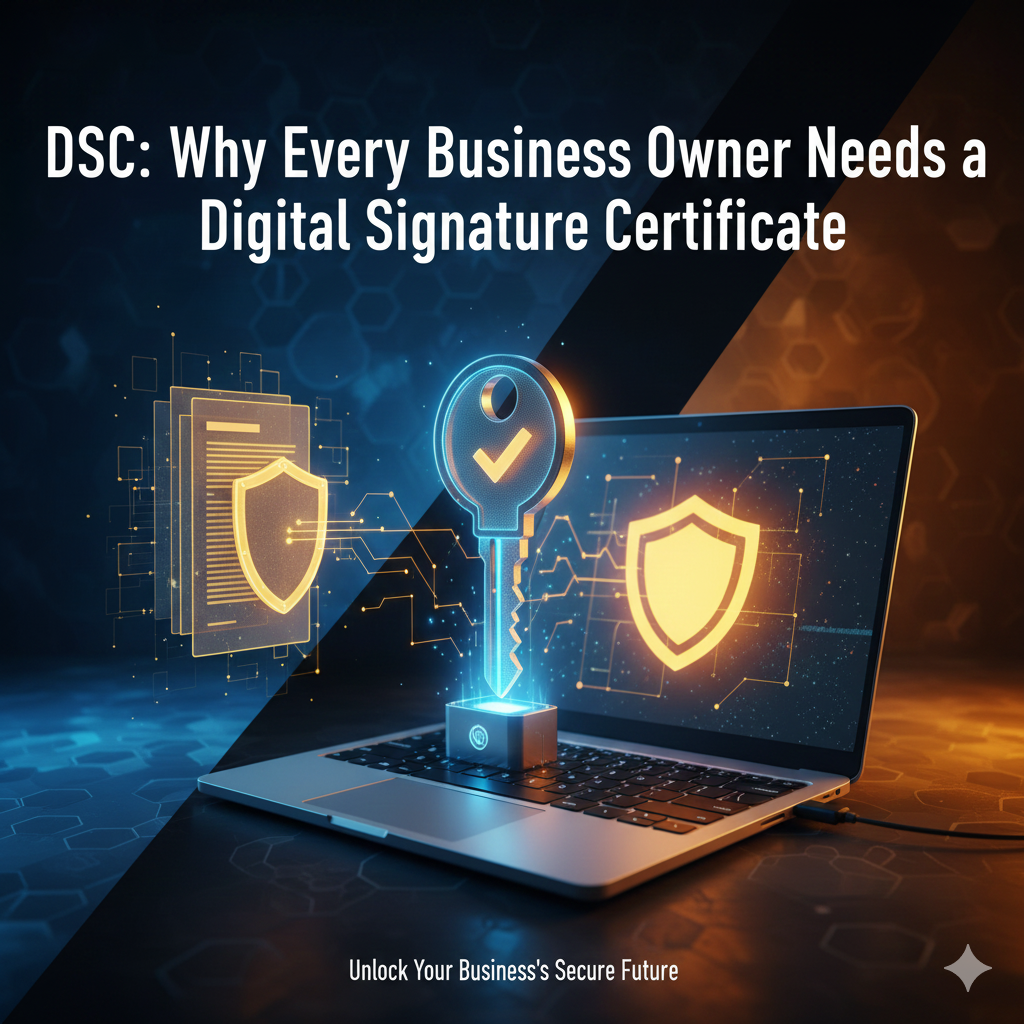Introduction: Your Digital Identity
In the modern digital economy, paper is becoming obsolete, and with it, the traditional wet-ink signature. For a business owner, transactions happen online, documents are exchanged via email, and compliance filings are done through government portals.
This digital shift makes the Digital Signature Certificate (DSC) not just a convenience, but a mandatory tool for security, authenticity, and legal compliance.
A DSC is the digital equivalent of your physical signature—and it’s essential for running a modern, efficient, and legally compliant business.
What Exactly is a Digital Signature Certificate (DSC)?
Simply put, a DSC is a secure digital key issued by a Certifying Authority (CA) that verifies the identity of the person signing a document.
- How it Works: When you digitally sign a document using your DSC, the system adds a layer of encryption that confirms two things:
- Authentication: The signer is definitely who they claim to be.
- Data Integrity: The document has not been tampered with or altered after being signed.
In India, a DSC is legally recognized under the Information Technology Act, 2000, giving it the same legal standing as a handwritten signature.
5 Reasons Why Every Business Owner Must Have a DSC
A DSC is the foundation for almost all high-value and regulatory transactions you conduct.
Reason 1: Mandatory Government Compliance (E-Filing)
For business owners, a DSC is often a legal requirement for filing documents with key regulatory bodies.
- MCA & ROC: Mandatory for filing all documents with the Ministry of Corporate Affairs (MCA) and Registrar of Companies (ROC).
- Income Tax Return (ITR): Required for e-filing income tax returns for companies, LLPs, and individuals whose accounts require auditing.
- GST: Necessary for signing various documents on the Goods and Services Tax (GST) portal.
- PF/EPFO: Required for signing certain forms related to PF and ESI contributions.
Reason 2: Time and Cost Efficiency (The Paperless Advantage)
A DSC enables a completely paperless workflow, drastically reducing operational costs and time.
- No Physical Movement: Documents are signed instantly, eliminating the need to print, manually sign, scan, courier, and file physical paperwork.
- Faster Closures: Contracts, invoices, and agreements can be executed almost instantaneously, accelerating business cycles and revenue recognition.
Reason 3: Enhanced Security and Data Integrity
A DSC provides a superior level of security compared to a physical signature, which can be forged.
- Non-Repudiation: Once a document is digitally signed, the signer cannot legally deny having signed it, as the signature is cryptographically bound to their identity.
- Tamper Detection: If anyone tries to modify the document after it has been signed, the digital signature becomes invalid, immediately alerting all parties to the tampering.
Reason 4: Global Accessibility and Mobility
Your DSC is stored securely on a USB token, meaning your signature is portable. You can sign contracts, file returns, and authorize transactions from anywhere in the world, requiring only a computer and internet access.
Reason 5: Essential for Tenders and E-Procurement
For businesses looking to secure government contracts or participate in tenders, a DSC is a prerequisite for submission. Most e-procurement portals require a Class 3 DSC for bidding.
DSC Types: Knowing What Your Business Needs
DSCs are issued in various classes based on the security level and use case. For almost all business and e-filing purposes, you will need the highest assurance level.
| DSC Class | Recommended Use Case |
| Class 3 DSC | Mandatory for MCA/ROC e-filing, GST, Income Tax filing, e-Tendering, and e-Procurement. |
| Class 2 DSC | (Largely discontinued/replaced by Class 3) Used primarily for basic document signing. |
Advice: Most CAs now only issue the Class 3 DSC as it meets the requirements for all major government and commercial applications.
Next Steps: How to Get Your DSC
- Select a CA: Choose a licensed Certifying Authority (CA) in India (e.g., eMudhra, Sify, Capricorn).
- Submit Application: Apply online, selecting the required class (Class 3) and validity (1 or 2 years).
- Verification: Complete the required Video Verification (for identity proof) and submit mandatory documents (PAN card, Address Proof, Organization Proof).
- Issuance: The DSC is issued on a secure hardware USB token (Cryptographic Token), which is then delivered to your address.
Conclusion: Secure Your Business Future
A Digital Signature Certificate is no longer a luxury—it is a mandatory tool that ensures your business operates legally, securely, and efficiently in the digital world. By obtaining a DSC, you not only comply with government mandates but also future-proof your administrative processes.







